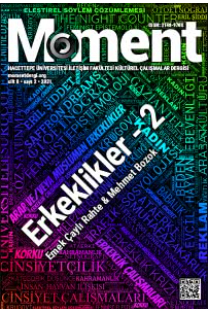KÜRT FINDIK İŞÇİLERİ: BİR ETNİK KARŞILAŞMA MEKÂNI OLARAK AKÇAKOCA
SEASONAL KURDISH HAZELNUT WORKERS: AKCAKOCA AS AN ETHNIC ENCOUNTER SPACE
___
- Bora, T. (2006). Medeniyet Kaybı. İstanbul: İletişim Yayınları.
- Chaney, D. (2002). Cultural Change and Everyday Life. Basingstoke: Palgrave.
- Chow, R. (2002). The Protestnat Ethnic and the Spirit of Capitalism. New York: Columbia University Press.
- Çınar, S. (2014). Öteki "Proleterya" De-proletarizasyon ve Mevsimlik Tarım İşçileri. Ankara: NotaBene Yayınları.
- Çınar, S. ve Lordoğlu, K. (2011). Mevsimlik Tarım İşçileri: Marabadan Ücretli Tarım İşçiliğine. Sosyal Haklar Sempozyumu, Bildiri Kitabı, s.419-448.
- Çırakman, A. (2011). Flags and Traitors: The Advance of Ethno-nationalism in the Turkish Self-Image. Ethnic and Racial Studies, 34(11), 1894-1913.
- Eley, G. ve Suny, R.G. (1996). Introduction: From the Moment of Social History to the Work of Cultural Representation. G. Eley ve R. G. Suny (Der.), içinde, Becoming National: A Reader (s.3-38). New York ve Oxford University Press.
- Ergil, D. (2000). The Kurdish Question in Turkey. Journal of Democracy, 11(3), 122-135.
- Ergun, A. ve Erdemir, E. (2010). Negotiating Insider and Outsider Identities in the Field: ,Insider' in a Foreign Land; ,Outsider' in One's Own Land. Field Methods, 22 (16), 16-38.
- Geçgin, E. (2009). Ankara Polatlı Örneğinde Sosyal Dışlanma Açısından Mevsimlik Tarım İşçileri. Ankyra: Ankara Üniversitesi Sosyal Bilimler Enstitüsü Dergisi, 1(1), 3- 35.
- Gürsoy, Ö. B. (2010). Bir Yaşam Biçimi Olarak Dışlanma. Ayşe Buğra (Der.), içinde Sınıftan Sınıfa Fabrika Dışında Çalışma Manzaraları, (s, 33-65). İstanbul: İletişim Yayınları.
- Hamdan, A. (2012). Autoethnography as a Genre of Qualitative Research: A Journey Inside Out. International Institute for Qualitative Methodology, 11(5), 585-606.
- Karaman, K. ve Yılmaz, A., S. (2011). Mevsimlik Tarım İşçileri ve Enformel İlişkiler Ağı: Giresun'da Çalışan Mevsimlik Tarım İşçileri Üzerine Bir Araştırma. Zeitschrift für die Welt der Türken, 3(1), s. 211-225.
- Kirişçi, K. and G.M. Winrow (1997). The Kurdish Question and Turkey: An Example of a Trans-state Ethnic Conflict. London: Frank Cass.
- Küçükkırca, İ., A. (2012). Etnisite, Toplumsal Cinsiyet ve Sınıf Ekseninde Mevsimlik Kürt Tarım İşçileri. Toplum ve Kuram, 6, 1-16.
- Lordoğlu, K. ve Etiler, N. (2014). Batı Karadeniz Bölgesinde Mevsimlik Gezici Tarım İşçiliğinde Çalışan Çocuklar Üzerine Sınırlı bir Araştırma. Çalışma ve Toplum, 2, 115-133.MacKenzie, R., ve Forde, C. (2009). The Rhetoric of the 'Good Worker' versus the Realities of Employers' Use and the Experiences of Migrant Workers. Work, Employment and Society, 23(1): 1242-159.
- Merton, R., K. (1972). Insiders and Outsiders: A Chapter in the Sociology of Knowledge. American Journal of Sociology, 78 (1): 9-47.
- Nuhoğlu, Ş. (2003). Gazap Fındıkları. Express Dergisi, 31, Kasım, 26-40.
- Nuhoğlu, Ş. (2004). Gazap Fındıkları. Express Dergisi, 42, Kasım, 36-44.
- Ricouer, P. (2004). Memory, History and Forgetting. USA: University of Chicago Press.
- Saraçoğlu, C. (2009). Exclusive Recognition: The New Dimensions of the Question of Ethnicity and Nationalism in Turkey. Ethnic and Racial Studies, 32(4), 640-658.
- Saraçoğlu, C. (2011). Kurds of Modern Turkey: Migration, Neoliberalism and Exclusion in Turkish Society, London, New York: I. B. Tauris.
- Ulukan, U. ve Ulukan, N., C. (2011). Fındık Üretiminde Çalışma İlişkileri ve Mevsimlik İşçiler: Perşembe Örneği, Gamze, Y. Özdemir, vd. (Der.), içinde, 2000'li Yıllarda Türkiye'de İktisat ve Siyaset Rüzgarları. Ankara: Efil Yayınevi.
- Updegraf, R. (2012). The Kurdish Question. Journal of Democracy, 23(1), 119-128.
- Yeğen, M. (1996). The Turkish State Discourse and the Exclusion of Kurdish Identity. Middle Eastern Studies, 32(2), 216-229.
- (1999). The Kurdish Question in Turkish State Discourse. Journal of Contemporary History, 34(4), 555-568.
- (2007). Turkish Nationalism and the Kurdish Question. Ethnic and Racial Studies, 30(1), 119-151.
- (2009). Prospective-Turks' or 'Pseudo-Citizens:' Kurds in Turkey. The Middle East Journal, 63(4), 597-615.
- Wu, J. ve Wang, M. (2012). Ethnic Migrant Workers and Emerging Ethnic Division in China's Urban Labor Market. Asian and Pacific Migration Journal, 21 (4): 483-507.
- Zhang, T., Y. (2013). Factory 'Nuns': The Ethnicisation of Migrant Labor in the Making of Tibetian Carpets. Gender, Place &Culture: A Journal of Feminist Geography, 20(6), 754-772.
- ISSN: 2148-970X
- Yayın Aralığı: 2
- Başlangıç: 2014
- Yayıncı: Hacettepe Üniversitesi İletişim Fakültesi
GÖÇMEN SİNEMASINI YENİDEN DÜŞÜNMEK
GİTMEDEN GÖÇMEK: BİR FOTOĞRAFÇININ DÜŞÜNDÜRDÜKLERİ ÜZERİNE
GÖĞE UZANAN BİNALARDA GÜNDELİK HAYATIN İNŞASI
Tarihten Geçenler YAŞAR KEMAL VE GABRIEL GARCIA MARQUEZ'İ ANMAK
MAHREMİYET, MELANKOLİ VE İKTİDAR BAĞLAMINDA ANTOINE D'AGATA
MAHREMİYET, MELANKOLİ VE İKTİDAR BAĞLAMINDA ANTOINE D'AGATA
ÖZNELERARASI BİR İLETİŞİM SÜRECİ OLARAK KÜLTÜREL VATANDAŞLIK
KÜRT FINDIK İŞÇİLERİ: BİR ETNİK KARŞILAŞMA MEKÂNI OLARAK AKÇAKOCA
Makaleler SINAV VE İKTİDARIN MEŞRUİYETİ: "VE PADİŞAH KELOĞLAN'A SORAR...."
